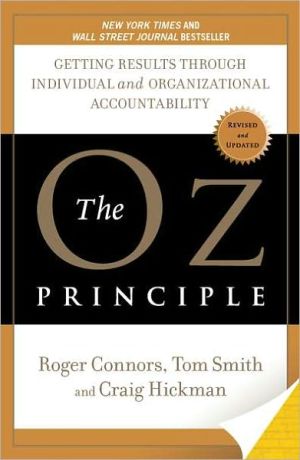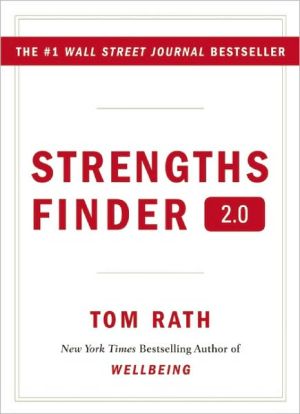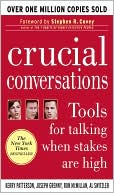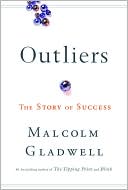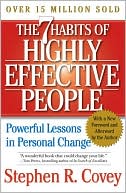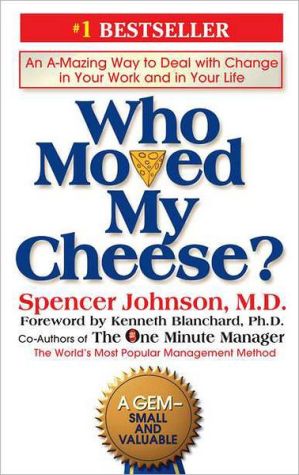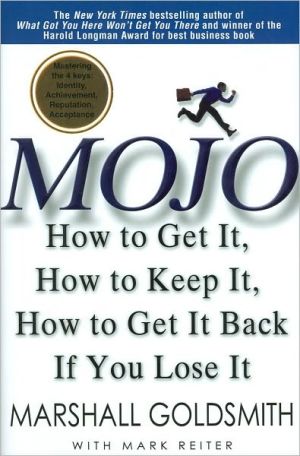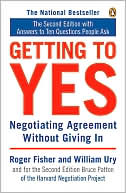The Oz Principle: Getting Results Through Individual and Organizational Accountability
The definitive book on workplace accountability by the New York Times bestselling authors of How Did That Happen?\ Since it was originally published in 1994, The Oz Principle has sold nearly 600,000 copies and become the worldwide bible on accountability. Through its practical and invaluable advice, thousands of companies have learned just how vital personal and organizational accountability is for a company to achieve and maintain its best results.\ At the core of the authors' message is the...
Search in google:
The definitive book on workplace accountability by the New York Times bestselling authors of How Did That Happen? Since it was originally published in 1994, The Oz Principle has sold nearly 600,000 copies and become the worldwide bible on accountability. Through its practical and invaluable advice, thousands of companies have learned just how vital personal and organizational accountability is for a company to achieve and maintain its best results. At the core of the authors' message is the idea that when people take personal ownership of their organization's goals and accept responsibility for their own performance, they become more invested and work at a higher level to ensure not only their own success, but everyone's. Now more than ever, The Oz Principle is vital to anyone charged with obtaining results. It is a must have, must read, and must apply classic business book.
The Oz Principle\ Getting Results Through Individual and Organizational Accountability \ \ By Roger Connors \ Portfolio\ Copyright © 2004 Roger Connors\ All right reserved. \ ISBN: 1591840244 \ \ \ \ Chapter One\ OFF TO SEE THE WIZARD: SEARCHING FOR GREATER ACCOUNTABILITY IN BUSINESS \ "Who are you?" asked the Scarecrow when he had stretched himself and yawned, "and where are you going?"\ "My name is Dorothy," said the girl, "and I am going to the Emerald City, to ask the great Oz to send me back to Kansas."\ "Where is the Emerald City?" he inquired; "and who is Oz?"\ "Why, don't you know?" she returned, in surprise.\ "No, indeed; I don't know anything. You see, I am stuffed, so I have no brains at all," he answered sadly.\ "Oh," said Dorothy; "I'm awfully sorry for you."\ "Do you think," he asked, "if I go to the Emerald City with you that Oz would give me some brains?"\ "I cannot tell," she returned; "but you may come with me, if you like. If Oz will not give you any brains you will be no worse off than you are now."\ "That is true," said the Scarecrow. -The Wizard of Oz, L. Frank Baum\ Like all powerful literature, The Wizard of Oz continues to enthrall audiences because its plot strikes a nerve. The book recounts a journey toward awareness; and from the beginning of their journey, the story's main characters gradually learn that they possess the power within themselves to get the results they want. Until the end, they think of themselves as victims of circumstance, skipping down the yellow brick road to the Emerald City where the supposedly all-powerful Wizard will grant them the courage, heart, wisdom, and means to succeed. The journey itself empowers them, and even Dorothy, who could have clicked her red slippers and returned home at any time, must travel the yellow brick road to gain full awareness that only she herself can achieve her desires. People relate to the theme of a journey from ignorance to knowledge, from fear to courage, from paralysis to powerfulness, from victimization to accountability, because everyone has taken this same journey himself. Unfortunately, even the most ardent admirers of the story often fail to learn its simple lessons: Don't get stuck on the yellow brick road; don't blame others for your circumstances; don't wait for wizards to wave their magic wands; and never expect all your problems to disappear. In today's complex environment, the temptation to feel and act like victims has become so pervasive that it has created a very real crisis.\ BUSINESS CHARACTER IN CRISIS\ Most companies fail because of managerial error, but not many CEOs and senior executives involved will admit that fact. Instead of taking responsibility for shortfalls and failures, far too many of today's business leaders offer every conceivable excuse from a shortage of resources to inept staff to competitor sabotage. From presidents in the Oval Office to entrepreneurs in the garage, no one wants to take responsibility for their misjudgments and mistakes. Yes, shortfalls and failures occur every day. This is a natural part of business and life, part of the human experience, but attempting to duck responsibility for such shortfalls and failures serves only to prolong suffering, retard correction, and prevent learning. Only acceptance of greater accountability for results can get a person, a team, or an organization back on the path to success.\ Unfortunately, no one wants to hear the brutal facts associated with bad news, especially Wall Street. No wonder the public's confidence in the economy, the stock market, business in general, and CEOs in particular, has plummeted to new lows. After Lucent's stock price dropped in value by more than 80 percent, CEO Rich McGinn was replaced because he had listened and responded to Wall Street rather than to his own company's scientists and salespeople. Lucent scientists were telling him that the company was losing its position in new optical technology; his salespeople were telling him that sales were being propped up by deep discounting. But that wasn't the sort of news that Wall Street wanted to hear, and McGinn knew it. McGinn had gotten very good at delivering unwavering growth, and stock analysts loved it. As a result, Wall Street glorified McGinn and his executive team. McGinn and Wall Street, it was a match made in economic heaven. Sadly, however, it was a fool's match made in a temporary heaven. Lucent's scientists and salespeople were eventually proven right. Competitor Nortel eclipsed Lucent by introducing improved voice and data transmission technology with huge market success, leaving Lucent lagging far behind, and the deep discounting eventually devastated the bottom line. McGinn was finally replaced by Henry Schacht, who spent his first few months on the job reminding Lucent shareholders and the rest of the world that a company's stock price is a byproduct, not a driver, of success. When the entire global economic system seems to favor rhetoric and excuses over results and accountability, the problem threatens us all.\ It threatened Xerox, even though Xerox CEO Anne Mulcahy finally faced reality and told Wall Street analysts that the company had an "unsustainable business model." Her acceptance of that reality came too late, as Xerox teetered on the brink of bankruptcy. For years, Xerox executives had been blaming the company's poor performance on everything from international politics to economic fluctuations to market upheavals, never facing the bad news of the company's deeply flawed business model. Management wizard Jim Collins, best-selling author of Good to Great and Built to Last, argues that what must glaringly separate great companies from mediocre ones is the latter's tendency "to explain away the brutal facts rather than to confront the brutal facts head-on." Companies such as Lucent and Xerox sank into mediocrity because they attempted to avoid accountability for the underlying causes of their bad news. They're not alone. The list of well-known companies that encounter problems, fail to face bad news and deal with it, and waste time justifying and explaining inadequate performance continues to grow. Enron, Arthur Andersen, Global Crossing, Kmart, Sunbeam, Tyco, WorldCom, AT&T, Polaroid, and Qwest all became slaves to Wall Street, turned a deaf ear to bad news, oversold their strategies, dumbed down their cultures, glorified their bosses, and made countless other mistakes that destroyed value.\ Even though Wall Street sends its share of wrong messages and certainly needs revamping, that's no excuse for any company to sit back and wait for the government to fix the system, or to blame others or circumstances beyond their control for poor results. When bad things unexpectedly happen, as they always do, or when serious errors in judgment occur, as they do more often than most of us wish to admit, accountable companies and their executives take action to control the damage and set a new course for achieving results. Much of Intel's current success dates back to a pivotal moment of accountability almost two decades ago. Japanese companies were pushing Intel's main line of business, memory chips, into the realm of cheap commodities. In a now famous interchange that still guides Intel's culture, CEO Andy Grove asked COO Gordon Moore, "If we got kicked out and the board brought in a new CEO, what do you think he would do?" They answered that question by acknowledging the hard facts, facing reality, and taking decisive action. They got out of the memory chip business and into microprocessors. After that, they did what they had to do to redirect the company, and that has made all the difference. Andy Grove's and Gordon Moore's decision to face some harsh realities and take their company in a whole new direction showed their employees, shareholders, and those on Wall Street who were willing to face reality that accountability pays, and pays handsomely, if you can only muster the necessary courage, heart, and wisdom to accept it.\ Most people in organizations today, when confronted with poor performance or unsatisfactory results, immediately begin to formulate excuses, rationalizations, and arguments for why they should not be held accountable, or at least, not fully accountable for an organization's problems. Such cultures of failed accountability or victimization have weakened business character, stressing ease over difficulty, feeling good over being good, appearance over substance, saving face over solving problems, and illusion over reality. This trend toward victimization will only further weaken business character, deluding business leaders into providing quick fixes over long-term solutions, immediate gains over enduring progress, and process over results. If left uncorrected in an organization, victim attitudes can erode productivity, competitiveness, morale, and trust to the point that correction becomes so difficult and expensive that the organization can never fully heal itself or its people.\ CAN THE WIZARDS HELP?\ Global business leaders have long been searching for management wizards who will magically bestow greater productivity, lower costs, expanded market shares, world-class competitiveness, swifter speed to market, continuous improvement, and instant innovation. With great excitement and fanfare, these wizards have taken the world's largest corporations on breathtaking adventures down attractive, but imaginary, paths to Oz, where the leaders eventually discover more make believe than make it happen. When you pull back the curtains you discover the incontrovertible fact, as did Dorothy and her companions, that success springs not from some new-fangled fad, paradigm, process, or program but from the willingness of an organization's people to embrace full accountability for the results they seek.\ Do all the new management solutions bring an organization great success and force its competitors to their knees? Hardly. Such solutions fall by the wayside in a year or two in favor of the next wave of management wizardry, bringing with it the hope of undiscovered improvements, profits, and growth. Moving from one illusion of what it takes to achieve organizational effectiveness to another, executives never stop long enough to discover the truth, that when you strip away all the trappings, gimmicks, tricks, techniques, methods, and philosophies of the latest management fads, you find one clear and compelling fact: The results you seek depend on shouldering greater accountability for those results. Regardless of the shape and texture of your organization's structure, the scope and sophistication of its systems, or the completeness and profoundness of its latest strategy or revitalized culture, your organization will not succeed in the long run unless people assume accountability for achieving desired results. Unless executives stop fooling around with the symptoms of organizational malaise, abandon their preoccupation with new-fangled philosophies that emerge each season, and start uncovering and putting to work the fundamental cause of success, they will simply continue to wallow in one distraction after another.\ In our view, the quest for greater results has, for too many business organizations, culminated in little more than a series of smokescreens and mirrors because it has failed to follow The Oz Principle. Like Dorothy and the Scarecrow and the Lion and the Tin Man, the power and ability to rise above your circumstances and achieve the results you desire resides within you. It may be a long journey of self-discovery, but in the end, you'll find you possessed that power all along. In this book, we want to go beyond current management and leadership fads, trends, and philosophies by focusing on the very heart of what it takes to attain success in business. This anniversary edition of The Oz Principle will draw upon more than a decade of experience at Partners In Leadership implementing the concepts and ideas presented in this book in hundreds of organizations. We will draw upon the experiences of thousands of individuals and hundreds of teams from a wide variety of both established and emerging companies whose stories will, we hope, strike a nerve the same way The Wizard of Oz has for generations.\ For instance, you'll meet an executive who tells how he and his associates consciously ignored the eroding competitiveness of their company's products and marketing programs over the years, pretending that things would get better without investing a huge amount of effort. He describes in his own words how the company finally came to face reality and began fighting for its life, the first step toward getting the results it once took for granted. Many of the best-run, most-admired corporations succumb from time to time to attitudes of victimization, failing to understand and apply the basic principles and attitudes that get results. Even the brilliant Jack Welch, Chief Executive Officer of General Electric for twenty years and font of wisdom for many American executives, failed more often than many people realize, but, like all truly accountable people, he accepted responsibility for overcoming any setback.\ You'll also hear from people at lower levels in their organizations, who, while experiencing genuine obstacles to performance, allowed themselves to get stuck in attitudes of victimization when only they themselves possessed the power to break the pattern and get results. For example, you'll meet a man who claims he can't advance within his company because his boss won't provide the coaching he needs; a director of financial analysis who worries that she's been taken off the fast track because she's a woman and needs more time with her children; a cake decorator who becomes distressed when her boss tells her to "get the lead out" and "get yourself into high gear," prompting her to sue the company; a marketing manager who blames R&D's late product introduction for his division's loss of market share and his own flagging performance; a CEO who argues that too much shareholder oversight has stifled the risk-taking of companies like his; and a department store buyer who fumes daily because it's just too hard to get anything done in a bureaucracy totally tangled up in red tape.\ Then you'll meet people with attitudes of accountability who work hard to hold themselves and others responsible for achieving the results they want. For example, at AES, the builder and operator of electricity-producing cogeneration plants, CEO Roger Sant implemented a "they busters" campaign with all the necessary buttons, posters, and flyers to help workers stop blaming the elusive "they" who always seem to stifle results. "They" represent all the finger-pointing, denying, ignoring, pretending, and waiting habits that grow up in organizations and keep people from taking charge of their own destinies. It worked, and AES's productivity has been climbing ever since. It's hard work.\ Continues...\ \ Continues... \ \ \ \ Excerpted from The Oz Principle by Roger Connors Copyright © 2004 by Roger Connors. Excerpted by permission.\ All rights reserved. No part of this excerpt may be reproduced or reprinted without permission in writing from the publisher.\ Excerpts are provided by Dial-A-Book Inc. solely for the personal use of visitors to this web site. \ \
PrefaceAcknowledgmentsPt. 1The Oz principle : getting results through accountabilityCh. 1Off to see the wizard : searching for greater accountability in business3Ch. 2The yellow brick road : getting stuck in the victim cycle18Ch. 3There's no place like home : focusing on results42Pt. 2The power of individual accountability : moving yourself above the lineCh. 4The lion : mustering the courage to see it67Ch. 5The tin woodsman : finding the heart to own it87Ch. 6The scarecrow : obtaining the wisdom to solve it111Ch. 7Dorothy : exercising the means to do it132Pt. 3Results through collective accountability : helping your organization perform above the lineCh. 8The good Witch Glinda : mastering above the line leadership157Ch. 9The emerald city and beyond : getting your entire organization above the line175Ch. 10Somewhere over the rainbow : applying Oz principles to the toughest issues in business today196Overview of Journey to the emerald city223The Oz principle accountability training225Index227
\ From the Publisher“The Oz Principle describes what we’ve all suspected - that it isn’t just America in crisis, but the American character. The good news is that Connors, Smith, and Hickman also describe the ‘yellow brick road’ we must follow to rebuild the dominant qualities to achieve success.” \ —Stephen R. Covey, author of The Seven Habits of Highly Effective People\ \ \
